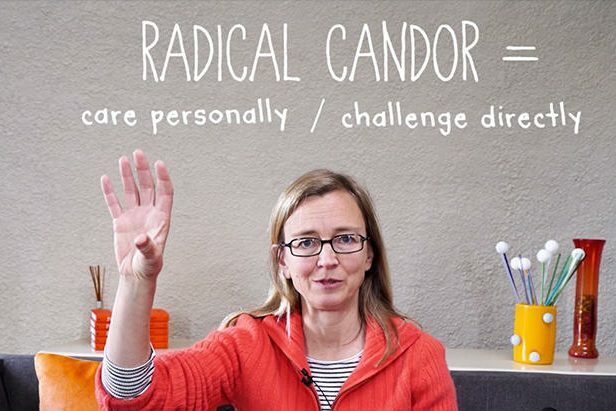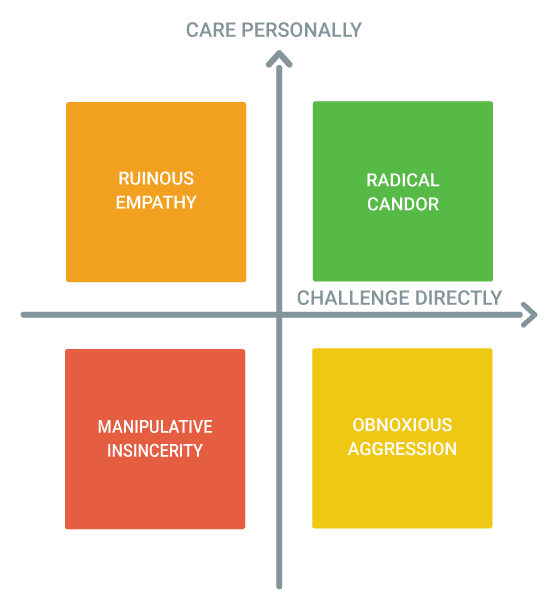6 Ways to Weave Radical Candor into Your Company's Core Values
By Jeanna Barrett, founder and chief remote officer at First Page Strategy, an award-winning, fully distributed growth marketing agency. Jeanna has...
6 min read
Kim Scott Mar 1, 2023 10:25:01 AM

We have learned something really important from the way that the press sometimes describes Radical Candor as brutal honesty. And we want your advice on how to communicate this idea more clearly.
We want to learn to describe Radical Candor in a way that is not open to misinterpretation: too often press articles assert that Radical Candor is the same thing as brutal honesty, as front-stabbing, or that it is some sort of license to be a jerk. It is none of those things!
Need help implementing Radical Candor? Let's talk!
What is brutal honesty? Well, too often, Radical Candor gets illustrated with cartoons of people who are clearly maniacal jerks (classic examples of brutal honesty). Every time something like that happens, all of us at Radical Candor feel a little sad for a moment.
But once we get over feeling sad, we realize that we are not communicating clearly enough, and this helps us improve.
Of course, it’s also true that people sometimes write what sells rather than what they actually think, or what they hear.
Follow these 4 steps to create psychological safety in your teams >>
But, in the spirit of listening with the intent to understand rather than to respond, we would like to figure out how we can communicate more clearly rather than to complain about clickbait!
There’s no reason why an accurate representation can’t be as clickable as an inaccurate one.
In short, we need some Radical Candor on Radical Candor :)
The whole point of Radical Candor is that it really is possible to Care Personally and Challenge Directly at the same time. The difference between brutal honesty vs. Radical Candor is caring personally about the people you are interacting with.
We CAN break free of a false dichotomy that leaves too many people feeling they have to choose between being a jerk and being incompetent.
That’s a terrible choice, and nobody has to make it. In fact, if you really care personally about somebody, you will tell them if you think they are making a mistake -- and when they are doing something great.
Radical Candor happens at the intersection of Care Personally and Challenge Directly. Care Personally means that you care about the other person, not about whether you are winning a popularity contest.
Challenge Directly means that you share your perspective and invite the other person to do the same.
There is a world of difference between Radical Candor and brutal honesty, or as we call it, Obnoxious Aggression. It’s bad, but Ruinous Empathy can be even worse, and Manipulative Insincerity is the worst of all.
The whole point of Radical Candor is that it really is possible to Care Personally and Challenge Directly at the same time.

We chose the word candor over truth or honesty very consciously.
There is nothing humble about the Truth. There was a Jesuit missionary a colleague of mine met in the Congo in the early '60s.
It’s important always to tell the truth.” The missionary then looked heavenward. “But who knows what the truth is?”
I always think of this Jesuit when somebody says to me, “I’m going to tell you the truth.” How are you so sure you know what the truth is? Are you sure I don’t have a clearer idea of the truth??
We chose the word candor because, to us, the word has more of a “here’s what I think, what do you think” connotation than the words “truth” or “honesty” do.
Why did we choose the word “radical?” Here’s a definition of radical: “(especially of change or action) relating to or affecting the fundamental nature of something; far-reaching or thorough.”
The reason we use the word Radical is that the kind of compassionate candor we’re talking about is rare. It feels unnatural to practice it. It flies in the face of the “if you don’t have anything nice to say don’t say it at all” maxim that most of us have heard since we learned to talk. Changing training that’s been instilled in us since we were eighteen months old is hard.
Often when we started sharing early versions of the candor materials with people, they called what we were talking about “brutal honesty” or “tough love.” Words like “brutal” and “tough” indicated it was OK to be a jerk.
But we are trying to rid the world of bad bosses, and so we are second to none in our adherence to the No Asshole Rule! So we don’t like those terms.
I had the opportunity to present this linguistic challenge -- how to describe in two words communication that is fundamentally kind even though it’s natural to worry it might be interpreted as “mean” -- to Dan Pink.
Dan has a genius for communicating big ideas in a couple of words. We were riding together in an elevator, and somewhere between the lobby and the fifth floor, Dan Pink exclaimed, “Radical Candor! I would read a book called Radical Candor!”
It’s important to clarify that Radical Candor is not “brutal honesty.” It is not “front-stabbing.” Radical Candor means Challenging Directly while also showing that you Care Personally. We are not sure why cartoonists keep illustrating it with some maniac yelling at others. That’s certainly not what we are trying to say!
How can we convey this message more clearly? We’d love to hear your thoughts -- or see your drawings!
Contact us >>
—————————————————————————————————————————
*This post was updated March 1, 2020.
Need more help getting feedback? Then you need The Feedback Loop (think Groundhog Day meets The Office), a 5-episode workplace comedy series starring David Alan Grier that brings to life Radical Candor’s simple framework for navigating candid conversations.
You’ll get an hour of hilarious content about a team whose feedback fails are costing them business; improv-inspired exercises to teach everyone the skills they need to work better together; and after-episode action plans you can put into practice immediately to up your helpful feedback EQ.
We’re offering Radical Candor readers 10% off the self-paced e-course. Follow this link and enter the promo code FEEDBACK at checkout.

By Jeanna Barrett, founder and chief remote officer at First Page Strategy, an award-winning, fully distributed growth marketing agency. Jeanna has...

We recently got the chance to talk with another leader who has rolled out Radical Candor on his team, and we wanted to share his experiences with...

I had such an interesting talk with the folks at First Round Capital about gender bias and Radical Candor. Read the full article, or check out these...